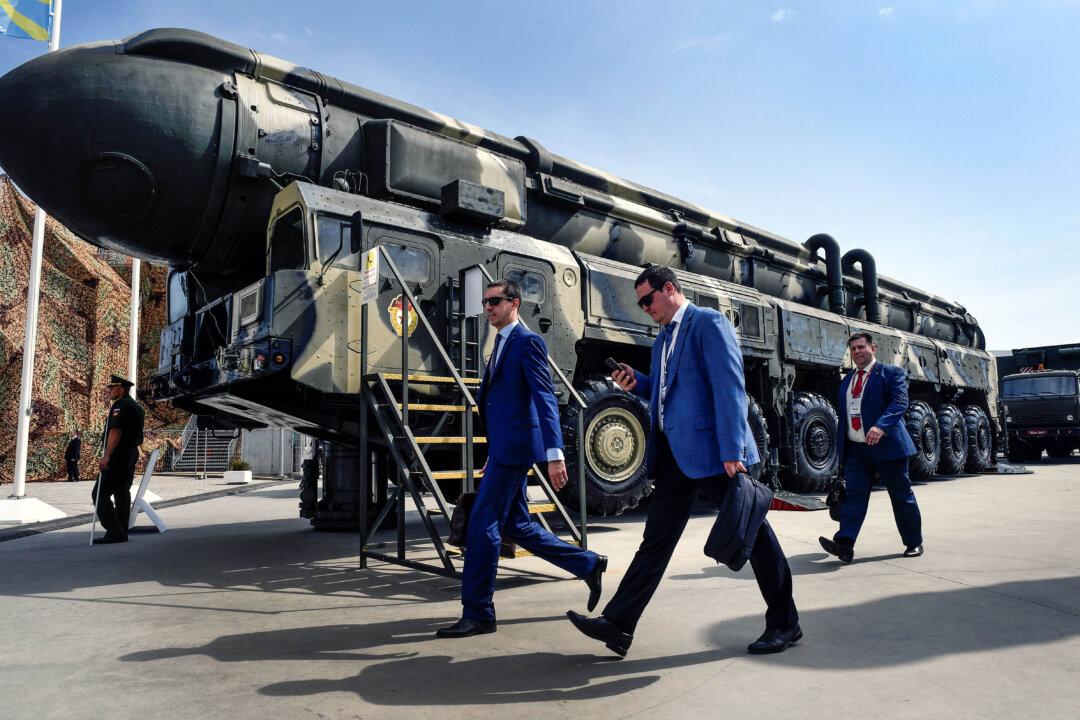Tensions between the United States and the Russian Federation have been steadily increasing since the Kremlin launched its invasion of Ukraine in March 2022.
The strained relations are set to be further exacerbated following a report to Congress from the U.S. State Department claiming Russia is refusing to allow on-site inspections and not responding to the Biden administration’s requests to discuss its alleged noncompliance with the New Strategic Arms Reduction Treaty (New START).
“Russia is not complying with its obligation under the New START Treaty to facilitate inspection activities on its territory,” the State Department said in a Jan. 31 statement accompanying its Russia New START Noncompliance Determination. “Russia’s refusal to facilitate inspection activities prevents the United States from exercising important rights under the treaty and threatens the viability of U.S.-Russian nuclear arms control.”
New START, signed by the United States and the Russian Federation in February 2011, obligates both nations to maintain the same number of long-range nuclear weapons in their arsenals that they had in 2018 through the treaty’s February 2026 termination.
According to the Washington-based Center for Arms Control & Non-Proliferation, Russia has about 5,977 nuclear warheads with 1,588 “deployed” while the United States has 5,550 nuclear warheads, including 3,800 that are “active.”
New START is the latest iteration of five decades of strategic weapons accords between the world’s largest nuclear powers, beginning with 1972’s Strategic Arms Limitation Talks.
The State Department’s noncompliance report is “sure to come up” at a Feb. 1 briefing on New START sponsored by the Arms Control Association (ACS), said Tony Fleming, director for communications with the nonpartisan group based in Washington.
ACS’s scheduled “Challenges and Prospects for Further U.S.-Russian Nuclear Arms Control” briefing will include comments from White House National Security Council Deputy Assistant Cara Abercrombie, who serves as deputy assistant to the president and coordinator for defense policy and arms control, and from Finland’s Ministry of Foreign Affairs Ambassador for Strategic and Arms Control Jarmo Viinanen, who is chair-designate of the 2023 Nonproliferation Treaty Preparatory Committee.
Panelists will include Steve Pifer, a non-resident Senior Fellow at the Brookings Institution and William J. Perry fellow at the Center for Stanford University’s Center for International Security & Cooperation; Vienna Center for Disarmament and Non-Proliferation Senior Research Associate Hanna Notte; and Federation of American Scientists Nuclear Information Project Senior Research Associate Matt Korda.
In a Jan. 31 tweet, Notte called the briefing an “important event” and said she will “speak about Russia’s refusal to meet with the U.S.” regarding New START compliance “and implications for the future of nuclear arms control.”
Pifer in a Jan. 31 tweet said the State Department’s non-compliance determination will also be on his mind during the briefing.
Panelists “will discuss New START’s contribution to U.S. and Russian security, its implementation [and non-compliance concerns], and prospects for future U.S,-Russia arms control,” Pifer writes, adding Russia is “not in compliance with obligations in New START Treaty to facilitate inspections and hold Bilateral Consultative Commission meeting.
“These problems can be readily fixed,” he added, “but they raise concern about Moscow’s attitude toward treaty.”
Apparently aware of the State Department’s report to Congress, on Jan. 30, Russian Deputy Foreign Minister Sergei Ryabkov told the Russian state news agency RIA Novosti that “it is a very possible scenario” that the Kremlin could allow New START to expire in 2026 without reaching a new nuclear arms control agreement with the United States.
While non-compliance with the existing treaty is a pressing issue, ACS said time is also a factor in negotiating a new strategic arms accord between the two nations.
New START “will expire in 1,100 days, on Feb. 5, 2026,” ACS said. “Unless Washington and Moscow begin serious negotiations on a new nuclear arms control framework, Russian and U.S. nuclear arsenals will be left unconstrained for the first time since 1972.”
In its statement accompanying the non-compliance determination, the State Department said Russia has resisted its treaty “obligation to convene a session of the Bilateral Consultative Commission” to discuss its alleged non-compliance but added the door remains open to address and remedy the U.S. allegations.
“Russia has a clear path for returning to full compliance. All Russia needs to do is allow inspection activities on its territory, just as it did for years under the New START Treaty, and meet in a session of the Bilateral Consultative Commission. There is nothing preventing Russian inspectors from traveling to the United States and conducting inspections,” it said. “The United States remains ready to work constructively with Russia to fully implement the New START Treaty.”





